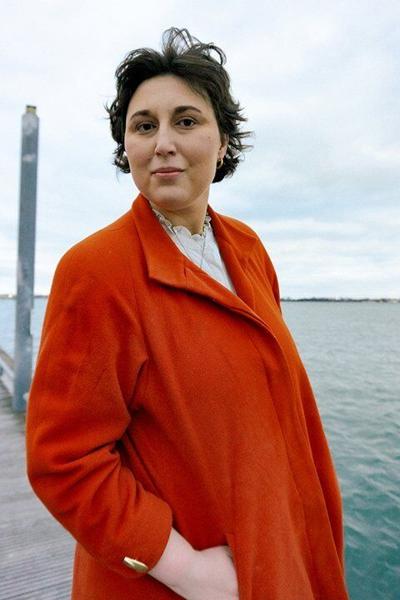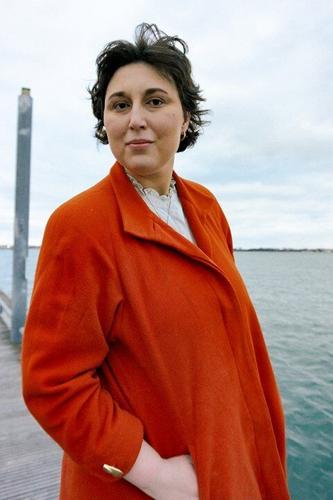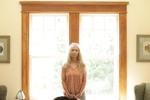I was recording the audiobook for my debut novel, “Bird Suit,” when I started to remember my childhood sexual abuse for the first time.
It was March, 2024, in a padded sound booth at a studio in ╬┌č╗┤½├Į. I had a nasty chest cold, worsened by Long Covid, and was chugging throat coat tea with honey between each take to stifle my cough. The sound engineers delivered cues through my headphones from one room over. We were on track to finish ahead of schedule when we reached a chapter where one character confides in another that she was sexually abused. When I read the section aloud for the first time, something shook loose in me: I could remember my own abuse in more detail than I ever could before. Light through blinds and from under the door. The bedsheets, and the pillow cases. I was separate from my body, watching myself from the other end of the room, when I was raped. I looked small, and very tired.
- Andrea Robin Skinner
Emotionally, I didnŌĆÖt feel anything at first. IŌĆÖd been diagnosed with a dissociative disorder years earlier, and was used to this kind of hypoarousal (a trauma response that triggers partial or complete emotional detachment). Through years of therapy, I learned my dissociation kept some of what IŌĆÖd gone through from my immediate awareness┬ĀŌĆö but I was comfortable not knowing what I didnŌĆÖt know.
*
That April left me exhausted. New memories surfaced in pieces. I made hesitant half-steps toward getting help, sharing some of what I remembered with my husband, and found a place called The Gatehouse that offered affordable peer-support programs for adult survivors of childhood sexual abuse.
But every time I tried to fill out an intake form, I froze halfway┬ĀŌĆö nauseous, and terrified.
The half-completed form sat in the front pocket of my purse for the entire book tour. Panic rose in me with every stop.
I wanted to be happy┬ĀŌĆö I did. I wanted to be proud of what I had done, and relish in what a tremendous gift it was to be signing books and posing for photos and meeting readers. But I wasnŌĆÖt, and every compliment made me feel worse. Fear and guilt gave way to shame and disgust and self hatred. What could these people possibly see in me? DonŌĆÖt they realize that I donŌĆÖt deserve any of this?
I was quickly unraveling. I wasnŌĆÖt sleeping. I couldnŌĆÖt write. I had panic attacks in the middle of sex. Everything I tried to eat tasted like it had gone off. I scrubbed myself in the shower until I was red and raw, but I didnŌĆÖt feel clean afterwards. I spent nights scrubbing our kitchen sink, until our apartment reeked like bleach, and my fingers were cracked. But I could still smell the rot. Nothing would ever be clean enough. Not the sink; not me.
*
On a Sunday morning that July, I read Andrea SkinnerŌĆÖs piece for the ╬┌č╗┤½├Į Star. She shared with the world that sheŌĆÖd been sexually abused by her stepfather when she was nine years old, and that her late mother, Alice Munro, had stayed with him anyway, and defended him for the rest of her life. After reconnecting with her siblings in adulthood, Skinner found support, hope and connection at The Gatehouse in ╬┌č╗┤½├Į. My own Gatehouse intake form was still sitting half-finished in my bag.
- Deborah Dundas, Betsy Powell
Munro had died in May of that year, a few days before my novel was published. A lot of my fiction lives in MunroŌĆÖs small town, Southern Ontario gothic tradition. I wrote my first book ŌĆö a collection of interconnected short stories called “The Pump” ŌĆö while I lived in London, Ontario, near where Munro grew up. The book’s epigraph is a quote from Munro herself, from one of her short stories. The Star published the very first review I had ever seen of my work in print, and that review mentions Munro in the very first sentence.
I deeply regret putting Munro on such a pedestal, and for positioning so much of my work in relation to hers.
But that Sunday morning was not about Munro. The words were AndreaŌĆÖs. The story belonged to Andrea┬ĀŌĆö both now, and as that active and curious nine-year-old.
Her bravery made me feel brave. As I read her story, I felt an affirmation of my own story, and a kind of permission to move forward in seeking help. That morning, I completed my intake form for Phase 1 of The GatehouseŌĆÖs peer-support program for adult survivors of childhood sexual abuse.
I began the program in August 2024, frightened, and not knowing what to expect, and it moves me deeply to share that I completed my Phase 1 last December, and have since completed my Phase 2 program . .
- Linda Svendsen, Contributor
*
It has been almost one full year since AndreaŌĆÖs essay motivated me to seek help for my abuse. Today, when I consider what my purpose is as a writer in a world overcome by hate and destruction, I look to one line of AndreaŌĆÖs in particular: ŌĆ£Today, safeguarding the vulnerable is still the driving force of my life.ŌĆØ
I donŌĆÖt believe that all survivors are obligated to share their stories, nor do I believe that survivors who are authors owe the story of their lives to their readers. But I have witnessed the power of storytelling to transform shame into solidarity. I do not owe my readers this piece, but I am writing it for them anyway, because my words have the potential to reach other survivors who are isolated and afraid, just as AndreaŌĆÖs words reached me. I want to be the kind of writer that safeguards the vulnerable, too. I was sexually abused as a child, and I sought out support, and today, I am alive. If you are looking for a sign, this is it.





























To join the conversation set a first and last name in your user profile.
Sign in or register for free to join the Conversation